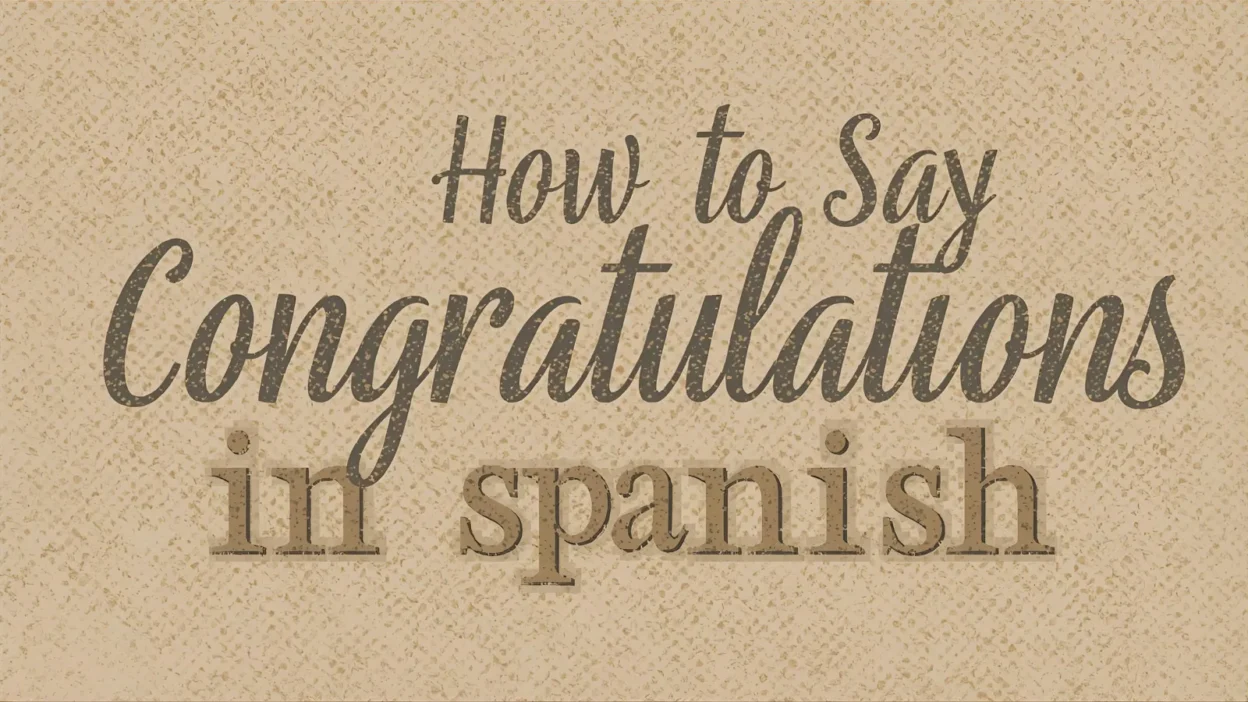Learning how to say congratulations in Spanish is a great way to celebrate someone’s achievements and share their happiness. The most common word is felicidades, but Spanish offers several phrases depending on the occasion, from birthdays to weddings and graduations.
By mastering these expressions, you’ll sound supportive, genuine, and culturally aware when celebrating special moments with Spanish speakers.
Congratulations in Spanish
Here are 15 ways to say congratulations in Spanish, complete with real-life dialogue examples and insights into their origin or common usage.
15 Ways to Say Congratulations in Spanish
| # | Spanish Phrase | English Meaning |
|---|---|---|
| 1 | ¡Felicidades! | Congratulations! |
| 2 | ¡Enhorabuena! | Congratulations / Well done! |
| 3 | ¡Muchas felicidades! | Many congratulations! |
| 4 | ¡Felicitaciones! | Congratulations! (formal) |
| 5 | ¡Bien hecho! | Well done! |
| 6 | ¡Excelente trabajo! | Excellent job! |
| 7 | ¡Te felicito! | I congratulate you! |
| 8 | ¡Lo lograste! | You did it! |
| 9 | ¡Qué alegría por ti! | What joy for you! |
| 10 | ¡Bravo! | Bravo! / Well done! |
| 11 | ¡Orgulloso de ti! | Proud of you! |
| 12 | ¡Sigue así! | Keep it up! |
| 13 | ¡Que sigan los éxitos! | May your successes continue! |
| 14 | ¡Eres increíble! | You are amazing! |
| 15 | ¡Mis mejores deseos! | My best wishes! |
1. ¡Felicidades!

Translation: Congratulations!
Origin/Use:
This is the most direct and widely used way to say congratulations in Spanish. It comes from felicidad, meaning “happiness.”
Example:
👤 Usuario A: ¡Ganaste el primer lugar!
👤 Usuario B: ¡Sí! ¡Felicidades a todos los que participaron!
Use: Universal — birthdays, weddings, achievements.
2. ¡Enhorabuena!
Translation: Congratulations! (Formal, Spain)
Origin/Use:
Literally means “in good hour,” and is commonly used in Spain, especially in formal or professional settings.
Example:
👤 Usuario A: Has conseguido el ascenso.
👤 Usuario B: ¡Enhorabuena! Te lo mereces.
Use: Formal, especially in Spain.
3. ¡Buen trabajo!
Translation: Good job!
Origin/Use:
A direct compliment used when praising effort or a task well done.
Example:
👤 Usuario A: Terminé el proyecto antes de tiempo.
👤 Usuario B: ¡Buen trabajo! Eso ayudará mucho.
Use: Informal or work-related contexts.
4. ¡Qué bien!

Translation: That’s great!
Origin/Use:
Used to express happiness or approval when someone shares good news.
Example:
👤 Usuario A: ¡Me dieron la beca!
👤 Usuario B: ¡Qué bien! ¡Te lo mereces!
Use: Informal, spontaneous reactions.
5. ¡Bravo!
Translation: Bravo!
Origin/Use:
Borrowed from Italian but common in Spanish applause or performances.
Example:
👤 Usuario A: [al final de una presentación]
👤 Usuario B: ¡Bravo! ¡Estuvo excelente!
Use: Performances, achievements, creative displays.
6. ¡Lo lograste!
Translation: You did it!
Origin/Use:
Celebrates someone’s success after effort. From lograr (to achieve).
Example:
👤 Usuario A: Pasé el examen final.
👤 Usuario B: ¡Lo lograste! Sabía que podías hacerlo.
Use: Informal, supportive, emotional moments.
7. ¡Bien hecho!

Translation: Well done!
Origin/Use:
Like “good job,” it’s used to acknowledge solid effort or performance.
Example:
👤 Usuario A: Aquí está el informe que pediste.
👤 Usuario B: ¡Bien hecho! Está perfecto.
Use: Work, school, or task-related praise.
8. ¡Eso merece una celebración!
Translation: That calls for a celebration!
Origin/Use:
Used humorously or genuinely when the success is big enough to party over.
Example:
👤 Usuario A: ¡Finalmente terminé mi tesis!
👤 Usuario B: ¡Eso merece una celebración!
Use: Excited or joyful tone among friends or family.
9. ¡Te lo mereces!
Translation: You deserve it!
Origin/Use:
Acknowledges the person’s hard work or worthiness.
Example:
👤 Usuario A: Me ofrecieron el puesto.
👤 Usuario B: ¡Te lo mereces! Has trabajado tanto.
Use: Emotional support, encouragement.
10. ¡Mis más sinceras felicitaciones!
Translation: My sincerest congratulations.
Origin/Use:
Formal and respectful version; often used in writing or speeches.
Example:
👤 Usuario A: Me casé el fin de semana pasado.
👤 Usuario B: ¡Mis más sinceras felicitaciones a los dos!
Use: Formal events, announcements, letters.
11. ¡Eres un campeón / una campeona!
Translation: You’re a champion!
Origin/Use:
Popular in sports and informal celebrations.
Example:
👤 Usuario A: Gané el torneo.
👤 Usuario B: ¡Eres un campeón! ¡Impresionante!
Use: Sports, games, casual hype.
12. ¡Orgulloso de ti! / ¡Orgullosa de ti!

Translation: Proud of you!
Origin/Use:
Not a direct “congrats,” but commonly used to show pride in someone’s success.
Example:
👤 Usuario A: Entregué el proyecto a tiempo.
👤 Usuario B: ¡Orgulloso de ti, hermano!
Use: Emotional, heartfelt praise from loved ones.
13. ¡Qué orgullo!
Translation: What pride! / So proud!
Origin/Use:
Celebrates shared success (e.g., child, student, friend).
Example:
👤 Usuario A: Mi hija ganó el concurso de ciencias.
👤 Usuario B: ¡Qué orgullo! Felicítala de mi parte.
Use: Family, mentor-student, community pride.
14. ¡Eso sí que es un logro!
Translation: Now that’s an achievement!
Origin/Use:
Adds emphasis when someone accomplishes something truly remarkable.
Example:
👤 Usuario A: Terminé el maratón en menos de 4 horas.
👤 Usuario B: ¡Eso sí que es un logro!
Use: Big accomplishments, admiration.
15. ¡Celebrémoslo!
Translation: Let’s celebrate it!
Origin/Use:
A festive follow-up to any congratulations.
Example:
👤 Usuario A: ¡Me aceptaron en la universidad!
👤 Usuario B: ¡Celebrémoslo esta noche!
Use: Excited, informal response with intention to party or share joy.
FAQs
1. What is the most common way to say “Congratulations” in Spanish?
The most common phrase is “¡Felicidades!” (pronounced: feh-lee-see-dah-dehs).
2. Can I also say “Congratulations” using “Enhorabuena”?
Yes, “Enhorabuena” is also correct and is used especially in Spain.
3. What’s the difference between “Felicidades” and “Enhorabuena”?
- Felicidades = Used for happy occasions like birthdays, weddings, achievements.
- Enhorabuena = Used to praise success or good results, like passing an exam.
4. How do I say “Congratulations on your success” in Spanish?
Say “¡Felicidades por tu éxito!”
5. How do I say “Congratulations to you both” in Spanish?
Say “¡Felicidades a los dos!”
6. How do I say “Congratulations, my friend” in Spanish?
Say “¡Felicidades, amigo!” (for male)
or “¡Felicidades, amiga!” (for female).
7. Can I use “Bravo” to congratulate someone in Spanish?
Yes, “¡Bravo!” is used to cheer or applaud someone.
8. How do I say “Well done” in Spanish?
Say “¡Bien hecho!” (meaning: good job).
9. How do I say “Congratulations on your graduation” in Spanish?
Say “¡Felicidades por tu graduación!”
10. How do I write Congratulations in a message or card in Spanish?
You can write:
“¡Felicidades! Estoy muy feliz por ti.”
(Meaning: Congratulations! I’m very happy for you.)
Conclusion:
Mastering how to say congratulations in Spanish allows you to celebrate milestones with warmth and sincerity. Whether you use felicidades for general success or enhorabuena for a specific achievement, these phrases help you connect emotionally and respectfully. By using the right expression, you’ll not only congratulate someone but also share in their joy authentically.

Sophia Mitchell is a passionate content writer known for creating clear, engaging, and informative articles.
She focuses on delivering well-structured content that is easy for readers to understand and trust.
Sophia Mitchell currently contributes quality writing to repliesnest.com, helping readers find accurate answers quickly.



